Carousel Blu-ray Movie
HomeCarousel Blu-ray Movie 
20th Century Fox | 1956 | 129 min | Not rated | No Release Date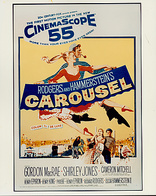
Price
Movie rating
6.4 | / 10 |
Blu-ray rating
| Users | 0.0 | |
| Reviewer | 3.5 | |
| Overall | 3.5 |
Overview
Carousel (1956)
A spirit in heaven gets a singular opportunity to revisit his past life on earth to help his young daughter reconcile his death and move on with her own life. One of two films shot in CinemaScope55.
Starring: Shirley Jones, Gordon MacRae, Cameron Mitchell, Robert Rounseville, Gene LockhartDirector: Henry King
| Musical | Uncertain |
| Drama | Uncertain |
Specifications
Video
Video codec: MPEG-4 AVC
Video resolution: 1080p
Aspect ratio: 2.55:1
Original aspect ratio: 2.55:1
Audio
English: DTS-HD Master Audio 4.0
Spanish: Dolby Digital Mono
Music: Dolby Digital 2.0
Subtitles
English SDH, French, Spanish
Discs
50GB Blu-ray Disc
Single disc (1 BD)
Playback
Region A (B, C untested)
Review
Rating summary
| Movie | 3.5 | |
| Video | 3.5 | |
| Audio | 3.5 | |
| Extras | 3.5 | |
| Overall | 3.5 |
Carousel Blu-ray Movie Review
Happily ever before.
Reviewed by Jeffrey Kauffman May 11, 2014Note: This film is currently available only as part of The Rodgers & Hammerstein Collection.
Most theater geeks and fans of Glee could probably correctly pair Strouse with Adams, Bock with Harnick, Adler with Ross,
Kander with Ebb, and Maltby with Shire, but even the relatively unwashed masses would have no problem recognizing
the vaunted partnership of Rodgers and Hammerstein. These two titans of the Broadway musical achieved their renown
though a combination of both incredibly artistry, providing the Great American Songbook with untold treasures from their
musicals, and fairly rare business acumen, which preserved their creative control over their properties but, due at least
in part to their role as producers as well as composer-lyricist-librettist, above the title billing which is usually reserved for
the acting talent. Rodgers and Hammerstein had each had their own individual successes prior to teaming with each
other, Rodgers most notably with Lorenz Hart and Hammerstein with Jerome Kern, but together they seemed almost
ideally suited to remaking the American musical in their own sophisticated yet homespun combined images. From the
1943 premiere of Oklahoma! on Broadway through 1960’s stage version of The Sound of Music, Rodgers
and Hammerstein enjoyed an almost unparalleled string of successes (despite occasional lackluster outings like
Allegro or Pipe Dream), with several of their shows still acclaimed as unmatched masterpieces to this
day. Because Rodgers and Hammerstein were so hands on in the curating of their properties, it actually took over a
decade for the first of their immense hits to even make it to the screen, but 1955 proved to be a stellar year for the
team on the silver screen, with not just that show, Oklahoma!, appearing in not one but two formats (and
versions), but their follow up Broadway smash Carousel also lighting up the screen with some of the same cast
as Oklahoma!. The Rodgers and Hammerstein musicals are all models of expert plotting and precise
characterizations, and they all benefit from the somewhat sardonic but mellifluous genius of Richard Rodgers, one which
acted as a sort of slightly bittersweet gin to Oscar Hammerstein’s effervescent tonic.
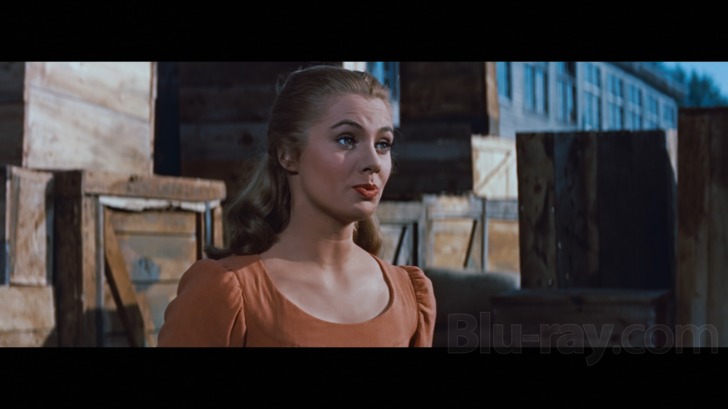
Several years ago I received a panicked phone call from the Executive Director of one of the Portland metro area’s largest theater companies at around four or five on a Friday afternoon. I had been recommended to the company as a fairly decent sight reader, and the Executive Director was wondering if I could come to the theater company—as in immediately—and both play keyboards and conduct the pit orchestra in their production of Carousel, since their Music Director had had an unfortunate health crisis and they had a performance scheduled to open in just a couple of hours. Like a lot of people, even a lot of musicians, I was passingly familiar with all the big songs out of Carousel, but I had never actually played through the entire score. That night was a trial by fire, especially as I attempted to navigate Trude Rittman’s often extremely complex dance arrangements, but it once again reminded me of what inimitable geniuses Rodgers and Hammerstein were in being able to craft an immediately accessible song score informing a sometimes tawdry story.
Though some of its nastier aspects are at least somewhat tamed in the film version, Carousel is one of the more politically incorrect musicals ever, at least if some of those politics are sexual. Billy Bigelow (Gordon MacRae) is a lout and a bully, even if he has a soft, charming side. When he takes a shine to virginal but headstrong Julie Jordan (Shirley Jones), it’s not exactly a match made in heaven. Ironically, heaven, or at least some suitable Hollywood facsimile thereof, is where large tracts of Carousel take place. We first meet Billy post mortem (almost Sunset Boulevard style), using up eternity by shining stars, until he’s informed that his loved ones are in trouble back on the earthly realm. That sets up the film’s central conceit, where Billy recounts how he ended up in heaven to a kindly Starkeeper (Gene Lockhart) who will determine if Billy can return to Earth for one day to hopefully set things right. It’s this maudlin and melancholy, but ultimately incredibly effective, artifice that gives Carousel a lot of its emotional heft. This is not going to be an “all singing, all dancing” extravaganza if it starts out by revealing its hero is already dead.
The film then segues to a flashback which shows Julie meeting and being instantly entranced by Billy at a carnival where Billy is the barker at the carousel. Julie and Billy begin a romance which has detractors on both sides of the aisle, something that later plays into the somewhat melodramatic intersection of several subplots. Billy's boorish behavior towards Julie is not the stuff of typical musicals of the forties and fifties, even if it's a bit whitewashed in Phoebe and Henry Ephron's screenplay adaptation of Hammerstein's book. Suffice it to say that Billy, in trying to do well by his newly pregnant wife, makes a bad decision which ends up having fatal consequences. After having delivered Carousel’s backstory for the bulk of the film, the final act then plays out in “contemporary” time as Billy does indeed return to Earth to confront his now teenaged daughter and, spiritually at least, Julie herself. It’s one of the most touching sequences in American musical film, one obviously designed for maximum throat lumpage, but one that clearly identifies an almost intrinsically American combination of grit and salvation, all playing out to the immortal “You’ll Never Walk Alone”.
It's obvious that the team behind Carousel took several pointers from the overwhelming success of the previous year's film adaptation of Oklahoma!, but curiously some of those decisions end up harming this film. Once again a combination of location and studio work is cobbled together, but here there's a much more problematically artificial look to some supposedly "real" locations (like the park Billy and Julie go to) that are obviously sets. Oklahoma! actually used the artificiality of the studio for its own benefit in some of the ballet and "dream" sequences of that piece. Here, they're meant to be part and parcel of some admittedly gorgeous widescreen photography in Maine and California, but they stick out like sore (plastic) thumbs. Rodgers and Hammerstein had themselves learned some lessons from the stage version of Oklahoma! when they wrote the original Broadway version of Carousel, and once again a primary love story is pitted against at least one nefarious type (whether that be Jud in Oklahoma! or Jigger here in Carousel), while simultaneously being contrasted with a second love story for supporting characters. Carousel is very much its own creation, however, and it is one of the pair's most sobering pieces of elegiac writing. Despite its size and spectacle (and in fact maybe because of its size and spectacle), the film version doesn't quite work some of the time, but if you stick with it for that heart wrenching coda, chances are you'll have one of those preordained lumps in your throat.
Carousel Blu-ray Movie, Video Quality 
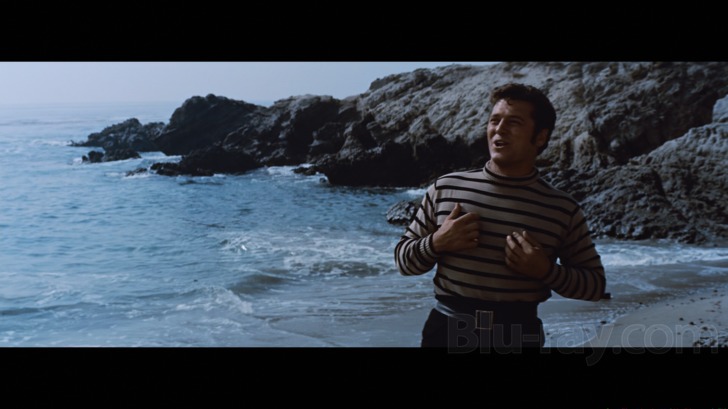
Carousel is presented on Blu-ray courtesy of 20th Century Fox Home Entertainment with an AVC encoded 1080p transfer in 2.55:1. As with some of the other releases in the Rodgers and Hammerstein Collection boxed set, color timing is an issue here. The elements, while in remarkably good condition from a damage standpoint, seem to have faded to that typically burnt out brown that makes reds rusty orange and fleshtones reek of so-called "Egyptian" makeup. Carousel's image is also rather soft at times, especially in some of the location work. Close-ups reveal some decent fine detail in things like fly away hair or the texture of some of the costumes. Contrast is generally very good and no digital tampering appears to have been done, leaving a natural film appearance.
Carousel Blu-ray Movie, Audio Quality 
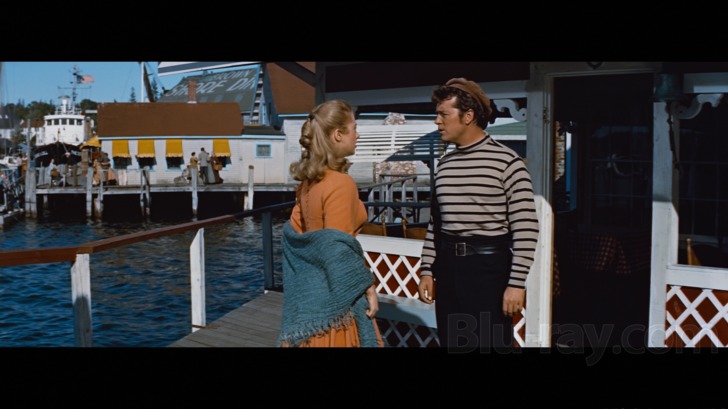
Carousel's lossless DTS-HD Master Audio 4.0 track nicely recreates the original sound design, with excellently splayed channels that mimic the widescreen placement of various performers. The calliope inspired orchestrations of pieces like "The Carousel Waltz" sound great here, but there is some minor but noticeable distortion in the upper midrange with regard to some of the voices. There's also a somewhat boxy accounting of some of the choral moments, notably things like the mens' choruses of "June is Bustin' Out All Over". Dialogue is cleanly and clearly presented, and overall fidelity on this track is very good.
Carousel Blu-ray Movie, Special Features and Extras 
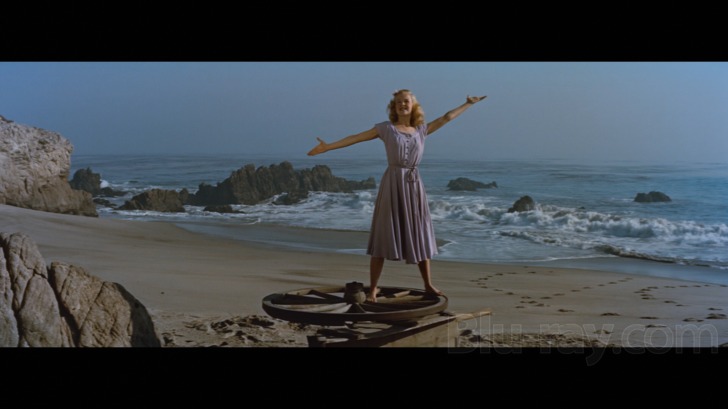
All of the supplements from the 50th Anniversary DVD set have been ported over to this Blu-ray release:
- Commentary by Shirley Jones and Nick Redman
- Isolated Score is presented in Dolby Digital 2.0.
- Play Film with Sing Along
- Music Machine
- Sing-Along
- Liliom (480i; 1:57:04) is Fritz Lang's film version of Ferenc Molnar's play.
- Turns on the Carousel (480i; 22:36) is a good background piece on the history of the project.
- Vintage Stage Excerpt (480i; 12:31) offers "You're A Queer One, Julie Jordan" and "If I Loved You" performed by Jan Clayton and John Raitt. This also features former South Pacific Nellie and future Sound of Music Maria, Mary Martin.
- Additional Songs (480i; 2:49) features audio recordings by Barbara Ruick and Shirley Jones performing "You're A Queer One, Julie Jordan", and Cameron Mitchell and Chorus doing "Blow High, Blow Low". Stills from the film accompany the songs.
- Movietone News: Carousel Opens at N.Y. and Hollywood in CinemaScope 55 (480i; 1:35)
- Theatrical Trailer (480i; 2:28)
- Still Galleries include Storyboards, Behind the Scenes, and Lobby Cards, One Sheets and Premieres.
Carousel Blu-ray Movie, Overall Score and Recommendation 
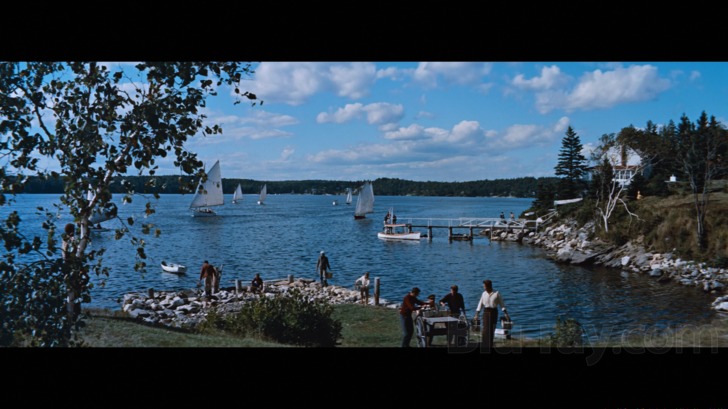
Carousel is a surprisingly dark outing in a genre that is often known for its sweetness and light. Containing what is arguably Rodgers and Hammerstein's greatest overall score, it's boisterously sung and acted here by MacRae and Jones, once again near perfectly cast, and a coterie of colorful supporting performers. Henry King's direction isn't especially memorable, and the segues between location work and studio bound scenes don't work nearly as well as they do in Oklahoma!. Colors have faded perceptibly in this transfer, and the soundtrack has some niggling issues as well.
Similar titles
Similar titles you might also like
(Still not reliable for this title)

State Fair
1945

Oklahoma! - Platinum Edition
1955

South Pacific
50th Anniversary Edition
1958

The King and I
1956

The Last Five Years
2014

Ziegfeld Girl
Warner Archive Collection
1941

Show Boat
Warner Archive Collection
1951

A Star Is Born
1954

West Side Story
50th Anniversary Edition
1961

Dirty Dancing: Havana Nights
2004

Stormy Weather
Limited Edition to 3000 - SOLD OUT
1943

Summer Stock
Warner Archive Collection
1950

Carmen Jones
Fox Studio Classics
1954

Fame
1980

A Chorus Line
1985

Dreamgirls
2-Disc Showstopper Edition
2006

Evita
15th Anniversary Edition
1996

Million Dollar Mermaid
Warner Archive Collection
1952

Rent
2005

Smash: The Complete First Season
2012